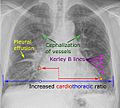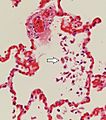Heart failure facts for kids
Heart failure happens when your heart can't pump blood as well as it should. Think of your heart as a powerful pump. If it's not working strongly enough, your body might not get all the blood and oxygen it needs. This is different from a cardiac arrest, where the heart stops working completely. With heart failure, the heart is still beating, but it's struggling. It can start suddenly, like after a heart attack, or it can develop slowly over time.
Contents
What Are the Signs of Heart Failure?
When someone has heart failure, their body might show certain signs. These signs happen because the heart isn't pumping blood efficiently.
Common Symptoms
- Shortness of breath: You might feel out of breath, especially when you're active. This can even happen when you're resting or lying down. Sometimes, people wake up at night feeling breathless.
- Swelling: Your legs, ankles, or feet might swell up. This is called edema. It happens because fluid builds up in your body.
- Frequent urination: You might need to go to the bathroom more often, especially during the night.
What Causes Heart Failure?
Many things can cause the heart to become weak over time.
Main Reasons
- Heart attacks: A heart attack can damage the heart muscle. This damage can make it harder for the heart to pump blood.
- High blood pressure: If your blood pressure is too high for a long time, it makes your heart work harder. Over time, this extra work can weaken the heart.
- Heart valve problems: Your heart has valves that control blood flow. If these valves don't open or close properly, it can strain the heart.
How Do Doctors Diagnose Heart Failure?
Doctors use different ways to find out if someone has heart failure.
Doctor's Examination
A doctor will ask about your symptoms. They will also examine your heart, blood vessels, lungs, and legs. They might check your liver for swelling too.
Medical Tests
To confirm the diagnosis, doctors often use special tests:
- X-rays: A chest X-ray can show if your heart is enlarged or if there's fluid in your lungs.
- Echocardiogram: This is an ultrasound test of your heart. It uses sound waves to create pictures of your heart. This helps doctors see how well your heart is pumping.
- Blood tests: Certain blood tests can help doctors check for signs of heart failure.
How Is Heart Failure Treated?
While a heart transplant is the only "cure," it's not common. Most people manage heart failure with medicines and other treatments.
Medications
Doctors often prescribe medicines to help the heart work better and reduce symptoms.
- Diuretics: These medicines help your body get rid of extra fluid, which can reduce swelling.
- Other medications: Medicines like ACE inhibitors and statins can help protect the heart and improve its function.
Other Treatments
Some people with heart failure might get an artificial pacemaker. This small device helps the heart beat more regularly and effectively.
Images for kids
See also
 In Spanish: Insuficiencia cardíaca para niños
In Spanish: Insuficiencia cardíaca para niños
 | Bayard Rustin |
 | Jeannette Carter |
 | Jeremiah A. Brown |





